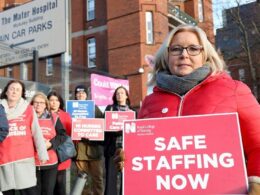By Laura Fitzgerald
ROSA Socialist Feminist Movement have made the call for a march for health, equality and bodily autonomy on Saturday 29 October, to commemorate Savita on the tenth anniversary of her death, with feminist, LGBTQ, anti-racist, trade union and student union activists all urged to participate. Socialist Party activists across the island are enthusiastically building for this demonstration.
- Abortion rights are under attack in many countries around the world
In 2021, the Chinese dictatorship – the same horrors that enforced the one-child policy – indicated its intentions to restrict abortion access. Poland’s extreme right government brought in a new abortion ban in 2020. Viktor Orban has signalled an intention to roll back on abortion access in Hungary via the cruel and medically dubious September 2022 measure to force anyone requesting an abortion to “listen to the foetal heartbeat”. Italy’s new far-right government poses a substantial threat to abortion there, in a country where access is already patchy and curtailed by widespread “conscientious objection” in the often Catholic-influenced hospitals.
Finally, in the US, the most famous gain of second-wave feminism, the Roe V Wade ruling that paved the way for federal abortion legalisation, was overturned earlier this year by a coterie of Christian fundamentalists who hold power in the Supreme Court. This counter-revolution was spearheaded by the Republican Party, and aided and abetted by the mealy-mouthed “safe, legal and rare” Democrats who consistently failed to legislate for Roe.
- Still travelling for healthcare
Limits in the law and access are leaving people behind. In 2021, 206 travelled from the South and 161 travelled from the North to access abortion care in Britain. Furthermore, the dire state of trans healthcare on this island means trans and nonbinary folk’s only hope of accessing gender-affirming care often involves travelling abroad. Gender affirming and abortion care must be free and accessible, decriminalised, locally available and devoid of paternalistic gatekeeping.
- We said ‘Never Again’
Izabela , November 2021. Agnieszka T, December 2022. These are at least two recent deaths of women that have been publicised by their grieving families, as a result of Poland’s 2020 ban. Both cases are eerily reminiscent of that of Savita who presented to a Galway hospital having an inevitable miscarriage at 17 weeks. Savita was denied a life-saving abortion that she repeatedly requested, because of the existence of a foetal heartbeat. When Izabela died, protestors flooded the streets under the slogan, “she had a heartbeat too”, just as we had done for Savita. In the post-Roe world in the US, dystopian reports are emerging of lawyers being called in before ectopic pregnancies can be treated, of nurses afraid to dispense the morning after pill to rape victims, of cancer patients’ treatment delayed, and of poor young women birthing children they can’t afford and didn’t want to have. We know abortion bans affect the poorest, the most marginalised, the sickest, the young, the rural, and those trapped in abusive relationships most of all.
- National Maternity Hospital
The government’s plan to gift a new National Maternity Hospital to the Sisters of Charity is a reason to march. We simply cannot accept that this is ‘done and dusted’ and a movement must emerge to force a change of course. Some of the same brass-necked politicians who very belatedly were forced to support repeal and cynically selfied from the ‘Yes’ victory platform in Dublin Castle are behind this plan. We have to put pressure on for public and secular and nothing less. All vestiges of church influence have to be ejected from public health and education.
- Anti-racism
Savita was a woman of colour and migrant healthcare worker dentist who died as a result of Ireland’s abortion ban. We know that women of colour are disproportionately affected by maternal deaths and poor outcomes for neonates. According to a 2017 maternal death inquiry, women born outside Ireland were over-represented. In the US, maternal deaths before Roe was overturned were already very high for a rich country, with black women three times more likely to die in childbirth than white women. Now the chilling effect of abortion restrictions on doctors will increase the danger in pregnancy, and that will affect black women most sharply. Fighting for abortion rights is a black lives matter and anti-racist concern.
The global context looms large as we build for the march. Electoral victories for the far-right in Sweden and Italy; Bolsonaro facing into the second round of the election in Brazil after staving off outright defeat in the first round; restrictions on abortions being passed or mooted in numerous countries around the world.
The Covid pandemic intensified gender oppression in the family and home, including gender-based violence increasing, and it also magnified the exploitation of women workers who disproportionately toiled on the frontlines including in healthcare with the resultant untold toll of burnout and mental distress. No sooner had the worst of the pandemic passed, then capitalism’s cost of living crisis has booted women workers from the frontline to the breadline.
The uprising in Iran, sparked in late September by the misogynistic state-sponsored femicide of Jina (Mahsa) Amini at the hands of the “morality police”, illustrates how linked the struggles for bodily autonomy, freedom, an end to misogyny and LGBTQIA-phobia are with any powerful revolt against dictatorship, poverty and capitalism. A new feminist wave emerged globally in struggle around the world in the 2010s. There’s a growing backlash from the right-wing against the gains of this movement. Already at a crucial juncture, capitalism’s cost of living crisis intensifies the necessity to push this feminist wave forward, with socialist feminism.
Delivering a significant march on 29 October could be an important step to reconstituting an active large feminist movement, within which the Socialist Party and ROSA will be raising the need for and organising to push a socialist feminist approach and programme.












